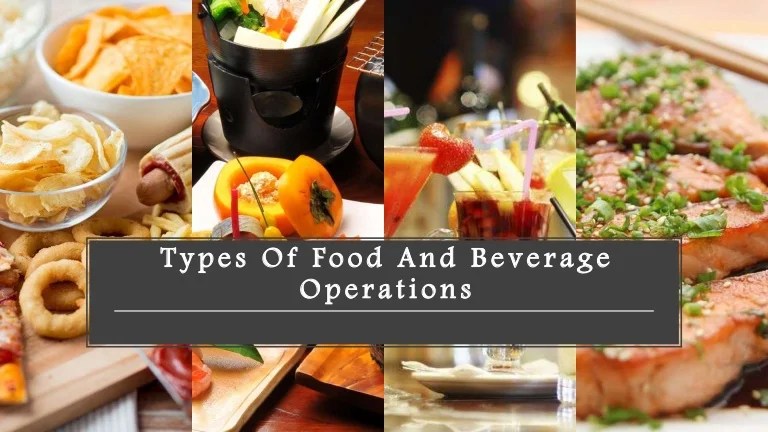Management of food and beverage operations 7th edition – In the realm of hospitality, the management of food and beverage operations holds immense significance, demanding a thorough understanding of its multifaceted aspects. The 7th edition of this seminal work delves into the intricacies of this field, offering a comprehensive guide to the principles, practices, and challenges involved in running a successful food and beverage establishment.
This authoritative text provides a detailed exploration of the key areas of food and beverage management, including planning, organizing, production, service, cost control, safety, marketing, human resources, technology, and sustainability. With its rigorous approach and wealth of practical insights, it serves as an invaluable resource for students, professionals, and entrepreneurs seeking to excel in this dynamic industry.
Introduction to Food and Beverage Management

Food and beverage management is a critical aspect of the hospitality industry, encompassing the planning, organizing, directing, and controlling of all activities related to the provision of food and beverage services in various establishments. It involves a wide range of responsibilities, including menu planning, food preparation, beverage service, cost control, and safety management.
The importance of food and beverage management lies in its ability to enhance customer satisfaction, increase profitability, and ensure the overall success of a hospitality operation. Effective management practices contribute to a positive dining experience, attract and retain customers, and optimize resource utilization, leading to improved financial performance.
Various Aspects of Managing Food and Beverage Operations, Management of food and beverage operations 7th edition
- Menu planning and development
- Food and beverage production
- Service operations and delivery
- Cost control and management
- Safety and sanitation
- Marketing and promotion
- Human resource management
- Technology integration
- Sustainability practices
Types of Food and Beverage Establishments
- Restaurants
- Bars and nightclubs
- Hotels and resorts
- Catering companies
- Cafeterias and coffee shops
- Food trucks and mobile vendors
Planning and Organizing Food and Beverage Operations

Planning and organizing are essential elements of successful food and beverage operations. Proper planning ensures that all aspects of the operation are coordinated and executed efficiently, while effective organization establishes a clear structure and division of responsibilities.
Importance of Planning and Organizing
- Improves efficiency and productivity
- Reduces costs and waste
- Enhances customer satisfaction
- Facilitates decision-making
- Provides a roadmap for operations
Steps Involved in Planning a Food and Beverage Operation
- Define the concept and goals
- Conduct market research
- Develop a menu and pricing strategy
- Design the layout and equipment
- Establish staffing and training plans
- Implement cost control measures
- Develop marketing and promotion strategies
Types of Planning Tools
- Business plans
- Operational plans
- Menu engineering
- Scheduling software
- Inventory management systems
Importance of Organizing Food and Beverage Operations
- Defines roles and responsibilities
- Establishes clear lines of communication
- Promotes teamwork and collaboration
- Facilitates decision-making
- Improves accountability
Types of Organizational Structures
- Line organization
- Line-and-staff organization
- Functional organization
- Matrix organization
Managing Food and Beverage Production

Food and beverage production is the process of transforming raw ingredients into finished products that meet customer expectations. It involves a series of steps, including recipe development, ingredient sourcing, cooking, and presentation.
Importance of Managing Food and Beverage Production
- Ensures product quality and consistency
- Optimizes resource utilization
- Controls costs and waste
- Complies with safety and sanitation regulations
- Enhances customer satisfaction
Types of Food and Beverage Production Systems
- Make-to-order
- Batch production
- Mass production
- Assembly-line production
Factors that Affect Food and Beverage Production
- Menu design
- Equipment and technology
- Staffing and training
- Ingredient availability and cost
- Production volume
Types of Food and Beverage Production Equipment
- Ovens
- Stoves
- Grills
- Fryers
- Mixers
- Refrigerators and freezers
Managing Food and Beverage Service
Food and beverage service is the process of delivering food and beverages to customers in a timely, efficient, and courteous manner. It involves a range of activities, including order taking, food preparation, beverage preparation, and table service.
Importance of Managing Food and Beverage Service
- Enhances customer satisfaction
- Improves operational efficiency
- Increases revenue
- Builds brand reputation
- Ensures compliance with safety and sanitation regulations
Types of Food and Beverage Service Styles
- Table service
- Counter service
- Buffet service
- Room service
- Take-out service
- Delivery service
Factors that Affect Food and Beverage Service
- Menu design
- Staffing and training
- Equipment and technology
- Volume of customers
- Physical layout of the establishment
Types of Food and Beverage Service Equipment
- POS systems
- Tabletop equipment (e.g., plates, glasses, silverware)
- Serving trays
- Beverage dispensers
- Ice machines
Managing Food and Beverage Costs: Management Of Food And Beverage Operations 7th Edition

Food and beverage costs are a significant expense for hospitality operations. Effective cost management is essential to ensure profitability and control financial performance.
Importance of Managing Food and Beverage Costs
- Controls expenses
- Improves profitability
- Optimizes resource utilization
- Enhances decision-making
- Complies with accounting and tax regulations
Types of Food and Beverage Costs
- Food costs
- Beverage costs
- Labor costs
- Overhead costs
Factors that Affect Food and Beverage Costs
- Menu design
- Ingredient prices
- Staffing and labor costs
- Equipment and maintenance costs
- Volume of customers
Types of Food and Beverage Cost Control Measures
- Menu engineering
- Inventory management
- Portion control
- Negotiating with suppliers
- Staff training and accountability
Frequently Asked Questions
What are the key aspects of food and beverage management?
Planning, organizing, production, service, cost control, safety, marketing, human resources, technology, and sustainability.
What are the benefits of using the 7th edition of Management of Food and Beverage Operations?
Comprehensive coverage, authoritative tone, practical examples, and up-to-date information on industry trends and best practices.
Who can benefit from reading Management of Food and Beverage Operations?
Students, professionals, and entrepreneurs in the hospitality industry, including food and beverage managers, restaurateurs, caterers, and culinary professionals.